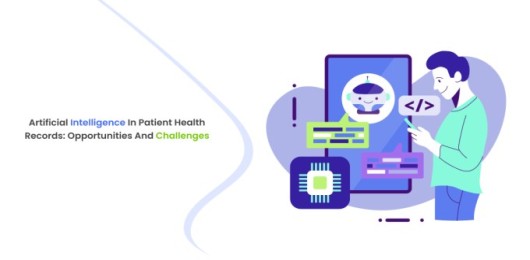Introduction:
In today’s healthcare environment, several applications of Artificial Intelligence (AI) have been realized; one of these is involved in the management of Patient Health Records (PHR) and patient clinical records. AI can provide a new level of innovation in the handling of big data, decision support for predictive analytics, and individual patient care. Yet, with all these advancements come problems that are associated with them which include privacy issues, ethics, and legal issues that must be addressed. This introduction grounds readers to how AI solutions are transforming PHR systems, considering the opportunities as well as challenges of realizing the role of AI in patient record management.
What is Patient Health Records?
Electronic Health Records (EHR) often referred to as patient clinical records or patient health records hold details about the patient’s history and the treatment they have undergone. These include diagnosing diseases, treatment prescriptions, plans for terminal illness, immunizations, dates for a specific dose of the vaccine, tests, and results. These can be kept in Computerized Permanent Health Records (CPHR) or Computerized Personal Health Records (CPPHR), electronically retrievable and easily manageable by the carers.
These records are extremely beneficial in the continuity of care as they provide avenues for healthcare givers to always make informed decisions; besides, the records enhance accurate relativity of information between healthcare giver and patient. PHRs enhance patient participation in their healthcare processes and contribute to their collaborative efforts at resolving healthcare problems throughout the continuum.
AI Technologies in Patient Health Records
Artificial intelligence (AI) is transforming updated methods of storing and correcting health records, and patient health data has become more obtainable. There are specific technologies that AI uses to effect this change as discussed below.
Machine Learning Algorithms:
Artificial intelligence is capable of extracting large volumes of data from EHR/EMR systems and employing pattern recognition, or the ability of machines to learn from experiences and past cases, to predict the health outcome of patients. This capability reinforces and strengthens patient care, especially in using early indicators for the design and implementation of preventative and tailor-made treatment programs.
Natural Language Processing (NLP):
NLP technologies utilize the means of obtaining and analyzing information from within patient clinical records which does not have a preconceived structured format. This can help in organizing and at the same time retrieving, summarizing, and even recording data with less of a load on the healthcare provider.
Automated Data Entry and H/issues regarding errors:
Automated Data Entry reduces the errors inherent in human beings in the maintenance of health records that need to be kept for quite some time. They assist in enhancing the standard of care since they help in maintaining a high degree of accuracy and consistent measurements in disease diagnosis, and patient records.
Real-Time Monitoring and Alerts:
AI systems can collect patient health data and check for trends at any point in time which makes it possible to alert the caregiver in instances of strange values or possible health complications. This real-time monitoring is very useful in patient care to give him or her early attention if the condition is worsening.
Enhanced Data Security:
AI technologies also help secure and protect the data of patients by identifying abnormal patterns of data access that may be vulnerable to a breach or violating privacy standards or regulations.
Conclusion:
In Electronic Patient Records, AI in Patient Health Records has significant opportunities in data management, insights for analytics, and patient personalized care. Nevertheless, the challenges that are associated with data accessibility include issues such as data privacy issues, ethical issues, and the issue of regulation. Navigating these opportunities and risks is imperative to AI in enhancing healthcare while guaranteeing the safe handling and use of patient health information.

